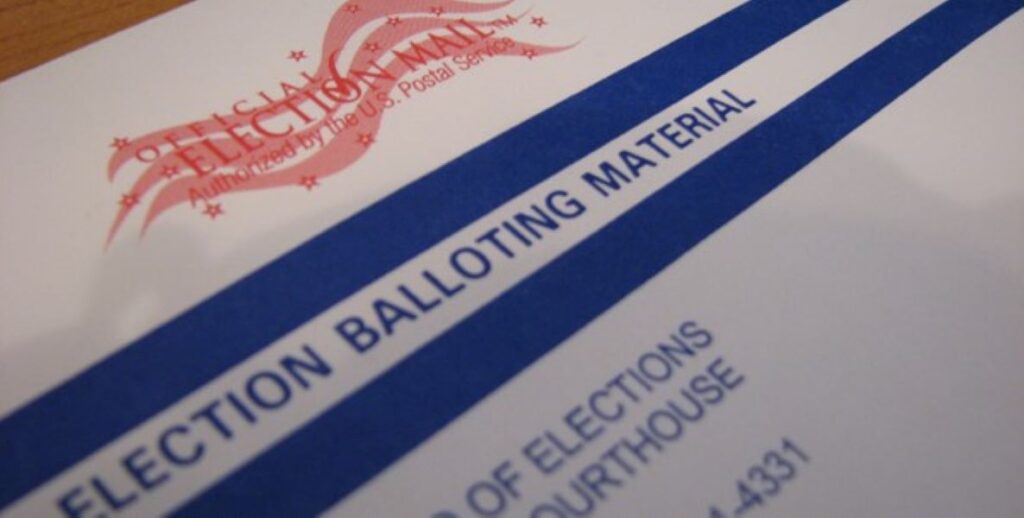Mail ballots for the November 8 general election have been arriving in mailboxes this week, and one curious feature of the ballot has caught the attention of some of our readers, so we did a little digging.
The issue is that the special elections for At-Large City Council members are broken up into two separate elections, rather than having all the At-Large nominees from the Democratic, Republican, and Libertarian parties all grouped into one contest.
Under normal circumstances in a regularly-scheduled municipal general election, voters are allowed to vote for up to five candidates in the At-Large City Council race, with all the parties’ candidates part of the same field.
On this ballot, however, there are two separate At-Large elections, Council At-Large #1 and Council At-Large #2.
In Council At-Large #1, voters can choose between Democrat Jim Harrity, Republican Drew Murray, and Libertarian Poetica Bey.
In Council At-Large #2, people can choose either Democrat Sharon Vaughn, Republican Jim Hasher, or Libertarian Marc Jurchak.
This split election had some observers suspicious about whether it reflected an effort to float some unfair advantage to the Democratic candidates, but according to City Commissioners sources who spoke on background, the ballot reflects the City Solicitor’s interpretation of the what the law requires in this case.
The issue is that the relevant statute refers to the office and the vacancy, leading to the Solicitor’s interpretation that each seat should be considered its own contest.
It does appear that there are some politics in play with the specific match-ups, but not by the Democratic side. Democrat Jimmy Harrity — likely the weaker of the two Democratic nominees — is matched with Drew Murray, who is probably the strongest Republican candidate in the field for 2022 and 2023 at this point.
Harrity is very likely to win anyway, due to the large Democratic voter identification edge in Philadelphia, but the rumor is that this match-up was no accident from Republican City Committee Chair Vince Fenerty.
Democratic City Committee had filed their nomination paperwork first, several days before the Republicans did, so Fenerty was able to see who the Democrats had placed in At-Large #1 and #2, and he allegedly filed Murray into #1 knowing that Murray would have more crossover appeal for certain Democratic voters.
While Sharon Vaughn is a known quantity in city government, Harrity is less so, and his main qualification for office seems to be that he’s buddies with Senator Sharif Street and former Congressman and Democratic City Committee Chairman Bob Brady. Harrity was the subject of an unflattering Inquirer profile a few weeks ago where it was made pretty clear that he’s unqualified for the job and is only in this position because he knows some guys, rather than because of any real track record of public service or professional success.
Anecdotally, conversations with other Democratic committee people in our network in different parts of the city give the impression that lots of people are fine with voting for Sharon Vaughn, but there’s a lot of reluctance to vote for Harrity and many people plan to write someone else in instead.
Murray, however, is not the most objectionable Republican around, and could possibly take some Democratic votes from Harrity.
Murray lives in Logan Square and is a past President of the Logan Square Neighbors Association. He also runs the Philadelphia Crosstown Coalition of neighborhood civic associations, and knows a lot of neighborhood activist types who are often also involved in ward electoral politics too. As such, he’s likely to have a lot of validators out there among influential Democrats.
Again, because of the large Democratic voter registration advantage, it seems highly unlikely that Murray would win the At-Large #1 race. But if he has a notably stronger showing than Jim Hasher does against Sharon Vaughn, Murray is probably more likely to get the Republican City Committee endorsement when he runs for the full At-Large Council term in 2023.
Jon Geeting is the director of engagement at Philadelphia 3.0, a political action committee that supports efforts to reform and modernize City Hall. This is part of a series of articles running on both The Citizen and 3.0’s blog.

